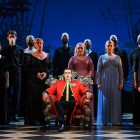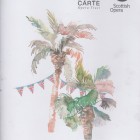Utopia Limited 2021Scottish Opera
Read more about the opera Utopia, Limited
A Rarity Revived
The received opinion of Utopia Limited (the formally correct comma was eventually removed) has always been that it represented a sad falling off in quality by comparison with its immediate predecessor, The Gondoliers. This is simply inaccurate, though it may be accepted that the final collaboration of Gilbert and Sullivan, The Grand Duke, of 1896, is indeed inferior.
Utopia only followed the 1889 The Gondoliers in the sense that it was the next G & S piece. The partners had a notorious falling out in 1890 and while negotiations to reunite them continued on and off for the next few years, Sullivan worked on his famous grand opera Ivanhoe, which enjoyed a long run in London. That took place at the specially-built Royal English Opera House (now the Palace Theatre, at present the home of Harry Potter). Sullivan then followed in 1892 with Haddon Hall, a more romantic comedy than G & S were used to providing. It had a text by the successful playwright Sydney Grundy.
Gilbert meanwhile also collaborated on new work with other composers, though less successfully.
When the G & S partnership resumed, Utopia, Limited became a more ambitious piece, with a large offering of solo roles and greater demands in terms of sets and costumes. The targets of Gilbert's satire include most elements of Victorian Britain's establishment - the army, navy, press, law, local government, city traders and the royal family. While it was initially quite successful, it was expensive to put on, so professional revivals were not undertaken during the 20th century because of the cost.
This staging
We were promised a semi-staged production, using the cast who were concurrently giving far more performances of a fully-staged rendering of The Gondoliers. This was an over-modest description of what the Edinburgh audience of 5 November were presented with (and cheered to the echo). Over the years we have seen many supposedly fully-staged efforts that were played with far less conviction. Everything was sung from memory and fully acted out. While the set for The Gondoliers was much simplified, losing the buildings, but retaining the black and white paving, this setting used a backcloth indicating tropical vegetation (which had been largely concealed by masonry in Barataria). It was much helped by the atmospheric lighting.
Costumes were completely different. The chorus was dressed in black - elegant evening gowns for the ladies, trousers and shirts for the men. Some of the principals wore more colour, certainly King Paramount and the women. The only occasion when colour was seriously missed was at the entrance of the Life Guards, where helmets with plumes were added, but there was no suggestion of the scarlet uniforms.
A text revised by the director brought the satire up to date. Insertions were almost entirely in the form of new dialogue, which blended seamlessly with the original. The Gilbertian text is quite long, so judicial trimming worked successfully. An interesting editorial decision is the removal of the character of the Public Exploder, a minor government official, sidekick to Scaphio and Phantis, who is an ever-present threat to the monarch. Gilbert presumably saw no limits to the reach of his satire in an age when anarchist outrages were happening (though Joseph Conrad's novel The Secret Agent was still fifteen years in the future). This excised character is called Tarara - no doubt a reference to the popular chorus 'Ta-ra-ra-BOOM-de-ay' which had just become a hugely popular addition to the repertoire of Lottie Collins, one of the original 'Gaiety girls.' Tarara, and another associate, Calynx, were hardly missed, with any essential sung text being taken over by the corrupt justices, both excellently played as elderly (Richard Suart) and youthful (Arthur Bruce).
The Musical Content
As Sir Arthur Sullivan and his assistants omitted to provide an Overture for Utopia, conductor Derek Clark took the simple means of settling the audience to the sounds of stately dance pieces brought forward from later in the work. The standard of the music is generally very high and was given a crisp performance by orchestra and chorus. Much of the orchestration is rich and varied - Sullivan at his best.
The large-scale ensemble that brings the first act to a close is hugely impressive, and a definite highlight of the evening. It is more complex than the act finales to The Mikado or Yeomen, and can be considered to show Sullivan's development through the composition of Ivanhoe.
Some musical elements might have been expected to require modifications. However this did not happen. Even the vaudeville sequence 'from the Court of St James's Hall', when King Paramount leads the six 'Flowers of Progress' in a spoof Christy Minstrels number of amusing verses, tongue-twisting choruses,and synchronised tambourine bashing, is performed without adjustment, and very funny - though the rapid patter was extremely difficult for seven singers to project, and not always crystal clear..
King Paramount is the dominant character throughout the evening, and was given a powerfully sustained reading by Ben McAteer. The six 'Flowers of Progress' were nicely differentiated, with William Morgan opening the second act with his comic solo 'A tenor all singers above' - probably the best-known solo passage in the work.
Mark Nathan was highly effective as the City gent (or spiv) Mr Goldbury, given the most prominent solo as the 'Flowers' make their appearance. Every word of 'Seven men form an Association' was crystal clear, culminating with the advantage of limited liability should your business fail - 'But the liquidators say - never mind, you needn't pay - so you start another company tomorrow!' His second act dreamlike tribute to beautiful English girls also worked well, including the sequence involving lady cricketers - 'eleven maids out, eleven maids in, and perhaps an occasional maiden over'.
Ellie Laugharne gave an excellent portrayal of Princess Zara with her sophisticated English (Girton-trained) ways. Her gauche and giggly younger siblings also made a positive impression. Their governess, Lady Sophy, was a far more attractive figure than the usual run of 'elderly, ugly ladies' that Gilbert usually included in his libretti. She became a suitable prospect for future Queen when the various deceptions were discovered.
In all, this was an excellent enterprise, thoroughly rehearsed and making an excellent case for the work. It is a pity that it is only scheduled to have three performances in total, a small reward for all the effort involved to reproduce it.
The effects of Coronavirus
The run of performances of this new staging, originally promised for the spring of 2020, fell a victim to the burgeoning threat of the Coronavirus (Covid-19) pandemic that swept the world during the first quarter of that year, with its effect continuing for many months. It was made clear on Monday, 16 March, that all meeting places of any significance - pubs, restaurants, concert halls, theatres and opera houses - would be closed for a significant duration. Not only was the scheduled new staging of A Midsummer Night's Dream cancelled, but also the subsequent productions of The Gondoliers and Utopia, Limited, The concert performances of Cavalleria rusticana and Zingari also bit the dust. It is hoped that those will both be revived when the theatres reopen, with luck sooner rather than later. The two Gilbert and Sullivan works were the first to emerge from their temporary oblivion, with The Dream announced for the spring of 2022.
The original 2020 performances were scheduled for Thursday 21/05 at 19.15 in the Theatre Royal, Glasgow; Friday 12/06 at 19.15 in the Usher Hall, Edinburgh and Friday 17/07 at 19.30 in Hackney Empire.
That third performance will now be given in London, still at the Hackney Empire, on 01 April, 2022.
Performance Cast
- Princess Nekaya Second Daughter of King Paramount
- Princess Kalyba Youngest Daughter of King Paramount
- Phylla a Utopian Maiden
- Scaphio a Judge of the Utopian Supreme Court
- Phantis a Judge of the Utopian Supreme Court
- Lady Sophy an English Gouvernante
- King Paramount the First King of Utopia
- Princess Zara Eldest Daughter of King Paramount
- Captain FitzBattleaxe First Life Guards
- Mr Goldbury a Company Promoter, later Comptroller of Utopian Household
- Lord Dramaleigh a British Lord Chamberlain
- Sir Bailey Barre, QC, MP a Barrister and Politician
- Captain Sir Edward Corcoran, KCB of the Royal Navy
- Mr Blushington of the County Council




